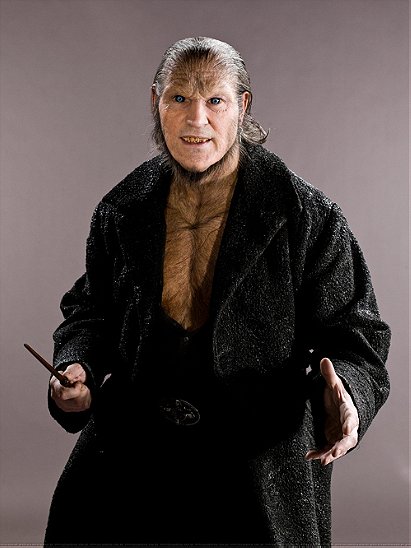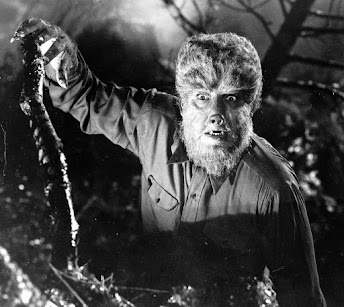Character Study of Remus Lupin from Harry Potter, Capstone
Character Study of Remus Lupin from Harry Potter
Including a Capstone study of the Cultural Impact of J.K. Rowling's Connection Between Werewolves and HIV
Etymology of the name Remus Lupin
Remus refers to Romulus and Remus of Roman mythology. Romulus and Remus were brothers who were constantly fighting to gain control of what would eventually become Rome. The brothers were nurtured when they were infants by a wolf. Another connection to werewolves comes from the intense rivalry between Romulus and Remus. This great tug-of-war of power symbolizes Remus Lupin's internal conflict between human and werewolf. Lupin also refers to werewolves. Canis lupus is the scientific name for the species called the wolf. Words such as canine and lupine are derived from this name. The name Lupin itself is derived from the Latin word lupinus which means wolf-like.
Living with Lycanthropy
Life as a child with Lycanthropy
When Remus Lupin was five years old, he was bitten by a werewolf named Fenrir Greyback. Remus' father, Lyall Lupin, was in the Ministry of Magic and was also on the court that tried to convict Greyback of killing two children. Lyall was the only member of the court to realize that Greyback was a werewolf. After Greyback was deemed innocent by the court and was released, Lyall said that Greyback deserved nothing less than death (https://harrypotter.fandom.com/wiki/Remus_Lupin). Greyback, who was sick of the insults wizards threw at him, decided to get revenge by biting Remus.
Remus lived a lonely childhood. His parents tried everything they could to find a cure for his lycanthropy, but no such cure existed at the time. Remus was not allowed to play with other children in case his condition made itself known. The Lupin family moved every time that other witches and wizards would take note of his strange behaviors around a full moon (https://harrypotter.fandom.com/wiki/Remus_Lupin). Special precautions were taken by Hogwarts Headmaster Albus Dumbledore so that Remus could attend Hogwarts and have a safe space where Remus could go for his monthly transformations.
| Young Remus Lupin with his father, Lyall and his mother, Hope. |
While at school, Remus found himself in a group of friends consisting of Sirius Black, James Potter (Harry Potter's father), and Peter Pettigrew. Remus kept his condition secret from his best friends and continually made up excuses to why he would disappear for a few days every month. At this point Remus' life, his transformations were described to be painful and he would often harm himself. Eventually, Remus' friends found out that he was a werewolf, but instead of deserting him, they accepted him and even went to the extent of figuring out how to become Animagi (essentially a wizard that can turn themself into an animal) to keep him in company and in check during his transformations. When his friends accompanied him, Remus' mind was tamer, although he still would be in his werewolf form.
 |
| This is a drawing by Brook Benjamin of the "Marauders" as they called themselves in their Animagi forms. Remus as "Moony" is the werewolf in the middle, James as "Prongs" is the stag on the right, Peter as "Wormtail" is the rat sitting on top of Prongs, and Sirius as "Padfoot" is the dog on the left. (https://www.pinterest.com/pin/394909461072398904/) |
Life as an Adult with Lycanthropy
As an adult, Remus Lupin learned of a new potion called Wolfsbane Potion that was intended to mitigate the worst effects of the lycanthropy. This potion would not prevent Remus from turning into a werewolf, but instead it would turn him into a sleepy werewolf that would prevent him from causing harm to anyone. He however, was often unable to afford the potion since the components were expensive (https://harrypotter.fandom.com/wiki/Remus_Lupin). Remus Lupin found it hard to find work as an adult. He lived in poverty, unable to find a job and unable to afford Wolfsbane Potion. Hogwarts Headmaster Albus Dumbledore found him and offered him the Defence Against the Dark Arts job at Hogwarts. Dumbledore once again provided precautions for Remus by reassuring him that the school had a large supply of Wolfsbane potion.
 |
| Remus Lupin as an adult at Hogwarts School of Witchcraft and Wizardry. |
Lupin immediately showed that he was a very skilled Defence Against the Dark Arts teacher that kept students interested in the subject matter. He did a good job of keeping his lycanthropy a secret, however, Hermione Granger did discover his werewolf identity, but kept it to herself as Lupin was the only decent Defence Against the Dark Arts professor she had had during her studies. One night, Remus was out during a full moon without having taken his Wolfsbane Potion for the month. He transformed into a werewolf in front of his students, Harry Potter, Hermione Granger, and Ron Weasley and attacked them.
 |
| Remus Lupin teaching third year Neville Longbottom in Defence Against the Dark Arts to confront his fear of the Bogart using the spell "riddikulus". |
Harry, Hermione, and Ron took no offense to this attack because they admired their teacher for his kindness and what he had taught them in class. However, because of this incident, Remus decided to resign his post as Defence Against the Dark Arts professor. Word of his condition had spread and parents of students would not be okay with a werewolf teaching at Hogwarts. Although the parents weren't fond of Lupin, many students remember him as the best Defence Against the Dark Arts professor they had ever had. Remus lived much of the rest of his life in fear of the stigma attached to him and did not wish to get close to people to attach that stigma to them (https://www.wizardingworld.com/writing-by-jk-rowling/remus-lupin).
After his death during the Second Wizarding War, Remus Lupin received the Order of Merlin, First Class for achieving great things in the Wizarding World. He was the first werewolf to receive this award.
Connections to Stigmas in the Real World- Capstone
Harry Potter author J.K. Rowling stated in a testimony that Remus Lupin's werewolf condition is a metaphor for HIV. Both HIV and lycanthropy carry extreme stigmas. Rowling says, "The wizarding community is as prone to hysteria and prejudice as the Muggle one, and the character of Lupin gave me a chance to examine those attitudes (https://www.wizardingworld.com/writing-by-jk-rowling/remus-lupin)". However, not all Harry Potter fans like this connection and deem it problematic and inappropriate.
J.K. Rowling wrote Remus Lupin to be a "good werewolf". Lupin always followed directions from his doctors including always taking his medicine, isolating himself from people he could be a threat to, and staying away from people during his transformations. Even though Lupin was considered to be a "good werewolf" to many of his close friends and family, he was still subjected to prejudice including having to resign from his job due to his condition. However, he did break a barrier when he was posthumously given the Order of Merlin, First Class as he was the first werewolf to receive that award (https://harrypotter.fandom.com/wiki/Order_of_Merlin).
 | ||
| Remus Lupin on the movie poster for Harry Potter And the Deathly Hallows Part 2 |
Most other werewolves in the Harry Potter universe are not considered good at all. Fenrir Greyback has been referred to as the "most savage werewolf alive today" by Remus Lupin himself. Greyback's mission in life was to spread lycanthropy to as many people as possible. This is a result of the prejudice that he has faced being a werewolf. In his mind, he wants to build a population of enough werewolves to overcome the wizards that have relentlessly thrown insults his way. Rowling says that Greyback specializes in children because he wants to raise them away from their parents to get them to hate normal wizards (https://harrypotter.fandom.com/wiki/Fenrir_Greyback).
 |
| Fenrir Greyback, the werewolf who bit Remus when he was a child. Greyback has been referred to as the "most savage werewolf alive today". |
Some fans disagree with this connection of werewolves and HIV because it actually further increases the stigma of HIV. In 2016, J.K. Rowling’s revelation that Remus Lupin’s character was meant to show this connection did not go over well on social media. HIV and lycanthropy are two completely different conditions; one requires a lifetime of daily management, and the other is a mythical concept that turns you into a werewolf (https://splinternews.com/dear-j-k-rowling-being-a-werewolf-is-not-like-having-1793861772 ). People also think that Rowling's depiction shows werewolves as less human as a result of their condition, and that they will turn against anyone that doesn't have their same condition as shown through her character Fenrir Greyback. Using werewolves in the Harry Potter universe as a metaphor for people that are living with HIV doesn't seem like the best idea after being shown characters like Fenrir Greyback. This connection might further the discrimination that people living with HIV endure.
In the British cultural magazine, New Statesman, culture editor Anna Leszkiewicz argues against J.K. Rowling's use of the metaphor in her descriptions on the Pottermore website. Leszkiewicz claims that "if being a werewolf is parallel to being a person with HIV, then this moment (Greyback wanting to spread lycanthropy) ascribes to one of our culture's most offensive smears: that those with sexually transmitted diseases are sexual deviants and will even rape the innocent simply to pass on their symptoms" (https://www.newstatesman.com/culture/books/2016/09/remus-lupin-and-stigmatised-illness-why-lycanthropy-not-good-metaphor-hivaids ). She argues that by Rowling's own statements, it seems like people are right to fear werewolves which is not what Rowling intended when she made the revelation.
In response to J.K. Rowling’s statements, Brendan G.A. Hughes said that this stigma that Rowling presents in her books perpetuates the idea that people living with HIV are dangerous and outsiders, much like how werewolves in the Harry Potter universe are seen (https://sites.duke.edu/hpracism/remus-and-the-i-totally-see-it-now/). He continues by discussing similarities between taking HIV medication and taking Wolfsbane potion. The medication ensures that a werewolf retains their consciousness even when they turn into a wolf. “Rowling probably had good intentions in making this connection,” says Patrick Hogan of SplinterNews, “but one thing I’m not sure she understands is that it’s not so much a question of whether the metaphor works. It’s a question of whether the metaphor is necessary” (https://splinternews.com/dear-j-k-rowling-being-a-werewolf-is-not-like-having-1793861772). Hogan argues that if J.K. Rowling wanted Remus Lupin’s life to be a statement about stigma and HIV, she could have just stated that Lupin had HIV instead of using lycanthropy as a cover.
Overall, Harry Potter fans dislike this connection that J.K. Rowling made between Remus Lupin, a character that suffers from lycanthropy, and people today living with HIV. Equating a fictional concept to something that millions of people endure everyday does not have good taste, especially in a coming of age series with many queer coded characters. This probably should have been something that J.K. Rowling should have never mentioned to her fans in the first place. The statement unintentionally brought more stigma towards the affected communities mentioned. Luckily, fans were quick to call her out and continue to do so even now in 2021 after she recently made anti-trans comments. Rowling remains problematic and does not seem to realize when she should stop trying to make these connections.
See these sources for more information! :
https://www.hp-lexicon.org/creature/sentient/werewolf/
https://harrypotter.fandom.com/wiki/Remus_Lupin
https://harrypotter.fandom.com/wiki/Fenrir_Greyback
https://www.wizardingworld.com/writing-by-jk-rowling/remus-lupin
https://www.newstatesman.com/culture/books/2016/09/remus-lupin-and-stigmatised-illness-why-lycanthropy-not-good-metaphor-hivaids
https://harrypotter.fandom.com/wiki/Order_of_Merlin
https://splinternews.com/dear-j-k-rowling-being-a-werewolf-is-not-like-having-1793861772
https://www.ncbi.nlm.nih.gov/pmc/articles/PMC6546279/
https://sites.duke.edu/hpracism/remus-and-the-i-totally-see-it-now/


Comments